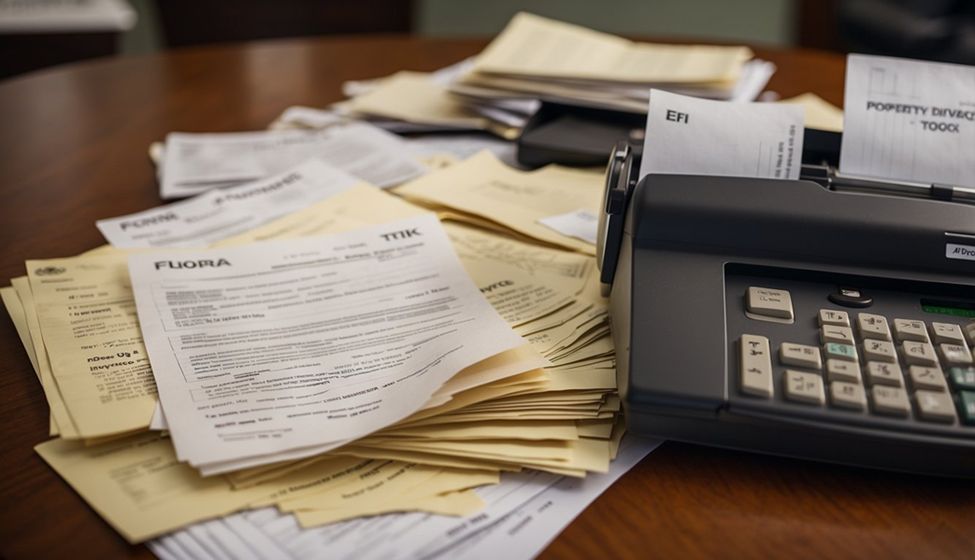The Financial Documents You May Need to Produce in Your Florida Divorce

Divorces can be challenging, especially when it comes to managing finances. In Florida, specific financial documents are required to ensure a fair settlement.
Key documents include a Family Law Financial Affidavit, tax returns for the past three years, and statements for all financial accounts.
It’s crucial to gather these records as they provide a clear picture of each spouse’s financial situation.
This helps both parties and the court understand the assets, debts, and overall financial health involved.
Transparency in financial matters can simplify divorce and lead to a more equitable resolution.
Legal professionals in Florida emphasize the importance of detailed and accurate financial disclosures.
Compliance with Florida Family Court Rules of Procedure is essential for a smooth and efficient divorce process.
Key Takeaways
- Financial transparency is vital in a Florida divorce.
- Important documents include financial affidavits and tax returns.
- Professional guidance can streamline the divorce proceedings.
The Importance of Financial Transparency

Financial transparency is essential for ensuring a fair and just resolution when undergoing a divorce in Florida. Clear, open sharing of finances positively impacts both parties, fostering trust and cooperation throughout the process.
Financial disclosure is critical during a divorce. Both parties must disclose all assets, liabilities, income, and expenses.
This transparent exchange lays the foundation for the equitable distribution of marital property and appropriate support orders.
Lack of transparency can lead to disputes and delays. When financial information is hidden or misrepresented, the legal process can become complicated, and resolutions may be unfavorable.
By contrast, full disclosure promotes a smoother and more efficient legal process. Honest and open sharing also builds trust. Trust can alleviate emotional stress, allowing both parties to focus on creating a fair settlement.
“Transparency with your financial documents not only facilitates a smoother divorce process but also helps ensure that both parties receive a fair settlement,” advises Christopher S. Mulligan, Attorney at Law.
This helps reach an agreement faster and reduces the emotional and financial burden on everyone involved.
By adhering to Florida’s laws and guidelines on financial transparency, individuals ensure compliance and fairness.
Utilizing tools like Financial Affidavits is essential. Such documentation provides a clear picture, aiding all aspects of the divorce process.
Key Financial Documents You’ll Need

Having the right financial documents is crucial when divorcing in Florida. These documents help ensure fair asset division and financial settlements. Below are key documents you’ll need to gather.
Income Documentation
Income documentation is essential for determining alimony, child support, and asset division.
Collect pay stubs, tax returns, and W-2 forms for all sources of income. For business owners, include profit and loss statements and business ownership papers.
Documentation of any side jobs or rental income should also be gathered.
Having this information ensures that both parties have a clear picture of each other’s financial capabilities.
It is also helpful to have records of earned bonuses or commissions. All of this is crucial for fair calculations.
Bank Statements
Bank statements from all accounts provide an accurate picture of your financial status.
Gather monthly statements for checking, savings, and joint accounts for at least the past year. These show spending habits, income deposits, and funds available for asset division.
Also, account for any transfers to hidden or lesser-known accounts. This prevents any surprises and ensures transparency.
Tracking these financial activities is vital for fair settlements and can reveal discrepancies needing addressing.
Investment Accounts
Investment accounts include stocks, bonds, mutual funds, and retirement accounts. Obtain statements from these accounts to show balances and transactions.
Statements from pension plans, 401(k) plans, and IRAs should also be considered. These documents are important for equitably dividing retirement savings and investment earnings.
Include records of investment purchases and sales. This will help ensure an accurate valuation of these assets.
“Failing to provide complete financial documentation can significantly delay divorce proceedings and lead to unfavorable outcomes. It’s crucial to get organized early and seek professional guidance if needed,” says Christopher S. Mulligan, Attorney at Law
Property and Assets
Property and assets cover real estate, vehicles, and valuable personal property. Collect property deeds, mortgage documents, and car titles.
Provide appraisals for homes and other significant properties and valuations for jewelry, art, and other valuable items. These documents are necessary for dividing physical assets.
Disclose business ownership papers if applicable. Accurate documentation of all assets ensures a fair division according to Florida divorce laws.
Debts and Liabilities
Debts and liabilities include credit card statements, loan agreements, and mortgage balances.
Gather statements that show the amount owed and any recent transactions for all debts. Include documents related to personal loans, student loans, and medical bills.
Disclosure of all debts, including recent history and shared debt obligations, ensures a fair approach to liability division.
This information lets both parties better understand the financial landscape and agree on a fair settlement.
Thorough and accurate financial records are essential for a fair asset division. Missing documents can create complications and extend the divorce process,” emphasizes Christopher S. Mulligan, Attorney at Law.
P rofessional Insights
Divorce requires precise handling of various financial documents. Knowing how to organize, creating a systematic approach, and seeking professional help can ensure that all essential paperwork is accurately compiled and submitted.
Tips for Organizing Your Financial Documents
Starting with proper organization is crucial. It ensures that everything needed for alimony calculations, child support documentation, and other divorce-related finances is easily accessible.
Use colored folders or labels to categorize documents. Separate files for income statements, tax returns, bank accounts, and property deeds can make the process smoother.
Digital tools like cloud storage or document management apps can also be helpful for quick access and backups.
Create a Checklist
A checklist can ensure all important documents are noticed. Include items like the past three years of tax returns, recent pay stubs, bank statements, and property titles.
Specific items such as financial affidavits and real estate deeds are necessary for Florida divorces.
Highlight the checklist items once they are prepared. This simple method reduces stress and boosts efficiency during the document-gathering phase.
Stay Organized
Maintaining organization throughout the divorce process can save time and reduce errors.
Designate a specific area for your financial documents to avoid misplacement. Regularly update and review your files to ensure they are current.
Utilize both physical and digital copies for redundancy.
This can be particularly helpful for complex cases with multiple assets or liabilities. Consistent organization aids in smooth and accurate financial disclosure.
Seek Professional Help
Sometimes, professional assistance is necessary. Financial advisors or divorce attorneys can provide valuable insights.
They can help create detailed financial affidavits that include income, expenses, assets, and debts. They might also guide you through the intricacies of alimony and child support calculations.
Engaging professionals such as a CPA or legal professional can ensure that all financial aspects are accurately documented and compliant with Florida law.
Conclusion
Filing for divorce in Florida can seem overwhelming, but prompt action can help. Gathering all necessary financial documents early can make the process more efficient.
Start with bank statements and tax returns. These are critical for determining income and expenses. Ensure they are up-to-date and complete.
Retirement accounts and investment records also play a significant role. Properly documenting these can prevent disputes.
Assets like property deeds and vehicle titles should be organized. Accurate records of assets help in fair division.
Debts and liabilities, including credit card statements, mortgages, and other loans, must be disclosed. Being transparent about debts can speed up negotiations.
Seeking professional help from a financial advisor or a divorce attorney can be valuable. These professionals can help you navigate the complexity of the required disclosures.
Preparing these documents early reduces stress and potential delays. To avoid complications, make sure everything is complete and accurate.
Legal Obstacles? Partner with Mulligan and Associates for Trusted Guidance
When legal issues arise, peace of mind is paramount. At Mulligan and Associates, we specialize in transforming legal complexities into clear, manageable solutions.
Whether you’re navigating the challenges of divorce, seeking protection through restraining orders, or addressing child custody matters, our team is here to guide and support you.
Our professional attorneys are not just skilled in litigation; they are dedicated to providing compassionate service for various needs, including adoption and child support.
Ready to move forward? Contact Mulligan and Associates today for professional representation and to regain your peace of mind.
Frequently Asked Questions
What financial documents are required for a divorce in Florida?
In a Florida divorce, both parties must provide several financial documents. These include a financial affidavit detailing income, expenses, assets, and debts. Tax returns for the past three years, bank statements, and pay stubs are also necessary. These documents ensure a fair settlement.
Are both parties in a Florida divorce required to submit a financial affidavit?
Yes, both parties must submit a financial affidavit. This document lists each person’s financial details, such as income, expenses, assets, and debts. It is crucial to determine how to divide the marital estate fairly.
Can one waive the mandatory financial disclosure in a Florida divorce case?
Waiving mandatory financial disclosure is not possible in Florida divorce cases. Both parties are legally required to exchange financial information to ensure an equitable distribution of assets and liabilities. This transparency prevents unfair settlements.
What happens if someone lies on a financial affidavit in a Florida divorce?
Lying on a financial affidavit can lead to severe consequences. If discovered, the court may impose penalties, such as fines. The dishonest party may also face sanctions, including an unfavorable ruling on the division of assets or increased alimony obligations.
How does the motion to compel mandatory disclosure operate in Florida divorces?
If one party fails to provide the required financial documents, the other can file a motion to compel mandatory disclosure.
The court may then issue an order forcing the non-compliant party to submit the necessary information. Failure to comply can result in further legal penalties.
What constitutes complete financial disclosure during divorce proceedings in Florida?
Complete financial disclosure involves providing all necessary documents to understand each party’s financial situation clearly.
This includes the financial affidavit, tax returns, bank statements, pay stubs, and other relevant documents. Full disclosure is essential for fair asset division and support determinations.
